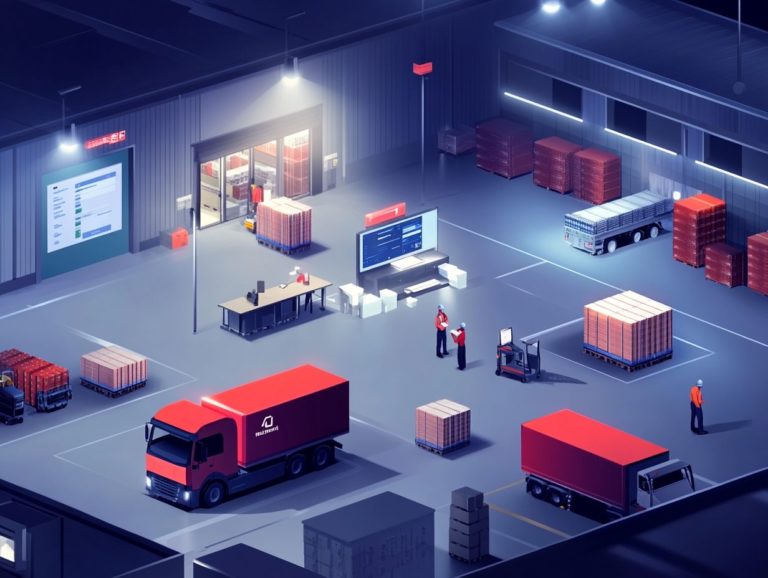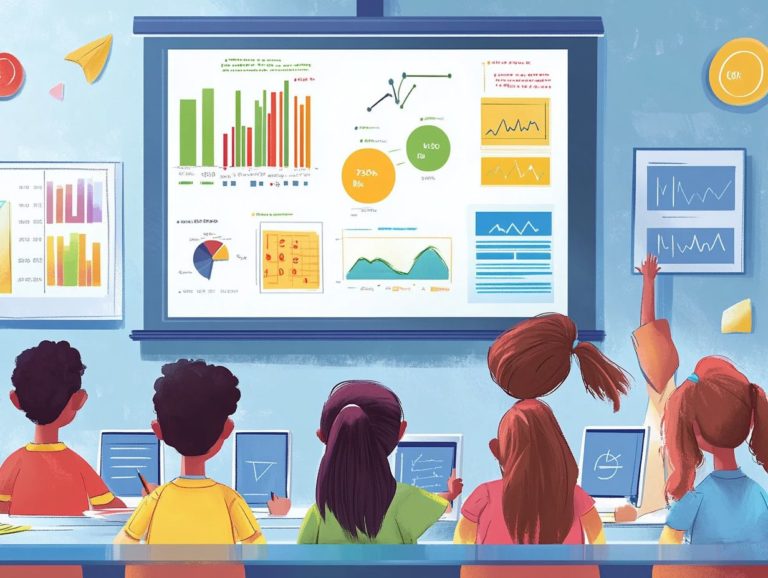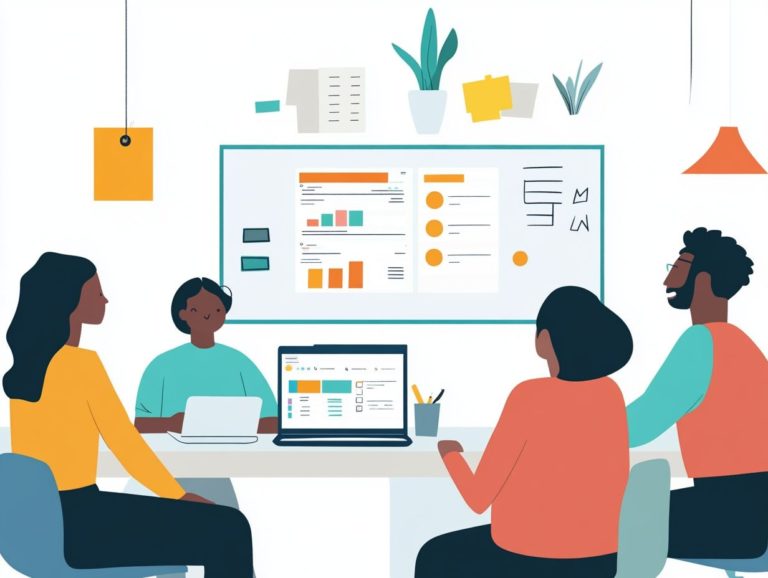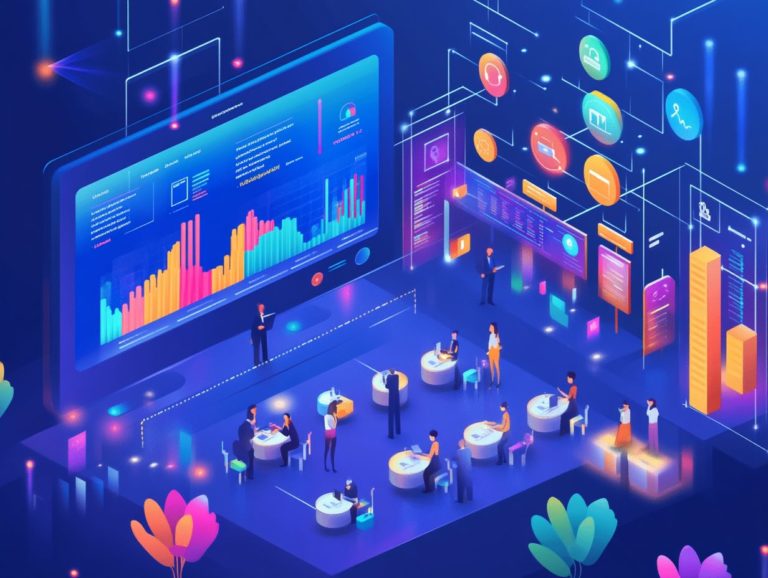92. How to Implement CRM in Your Restaurant
In today’s competitive restaurant landscape, grasping and utilizing Customer Relationship Management (CRM) can truly be a game changer for you.
This article delves into what CRM is and underscores its essential role in enhancing customer experiences and fostering loyalty. You ll discover the numerous benefits of implementing CRM in your establishment, from elevating customer service to crafting impactful marketing strategies.
A comprehensive, step-by-step guide on successfully implementing CRM is at your fingertips, ensuring your restaurant excels in connecting with guests.
Dive in to discover how CRM can revolutionize your operations and enhance your customer engagement!
Contents
- Key Takeaways:
- Understanding CRM in the Restaurant Industry
- Benefits of Implementing CRM in Your Restaurant
- Steps to Implement CRM in Your Restaurant
- Frequently Asked Questions
- Q1. What is CRM and why is it important for restaurants?
- Q2. How can I implement CRM in my restaurant?
- Q3. What are the benefits of using CRM in my restaurant?
- Q4. What type of CRM software should I use for my restaurant?
- Q5. How can I train my staff to use CRM effectively?
- Q6. Can I use CRM for my online orders and delivery services?
Key Takeaways:
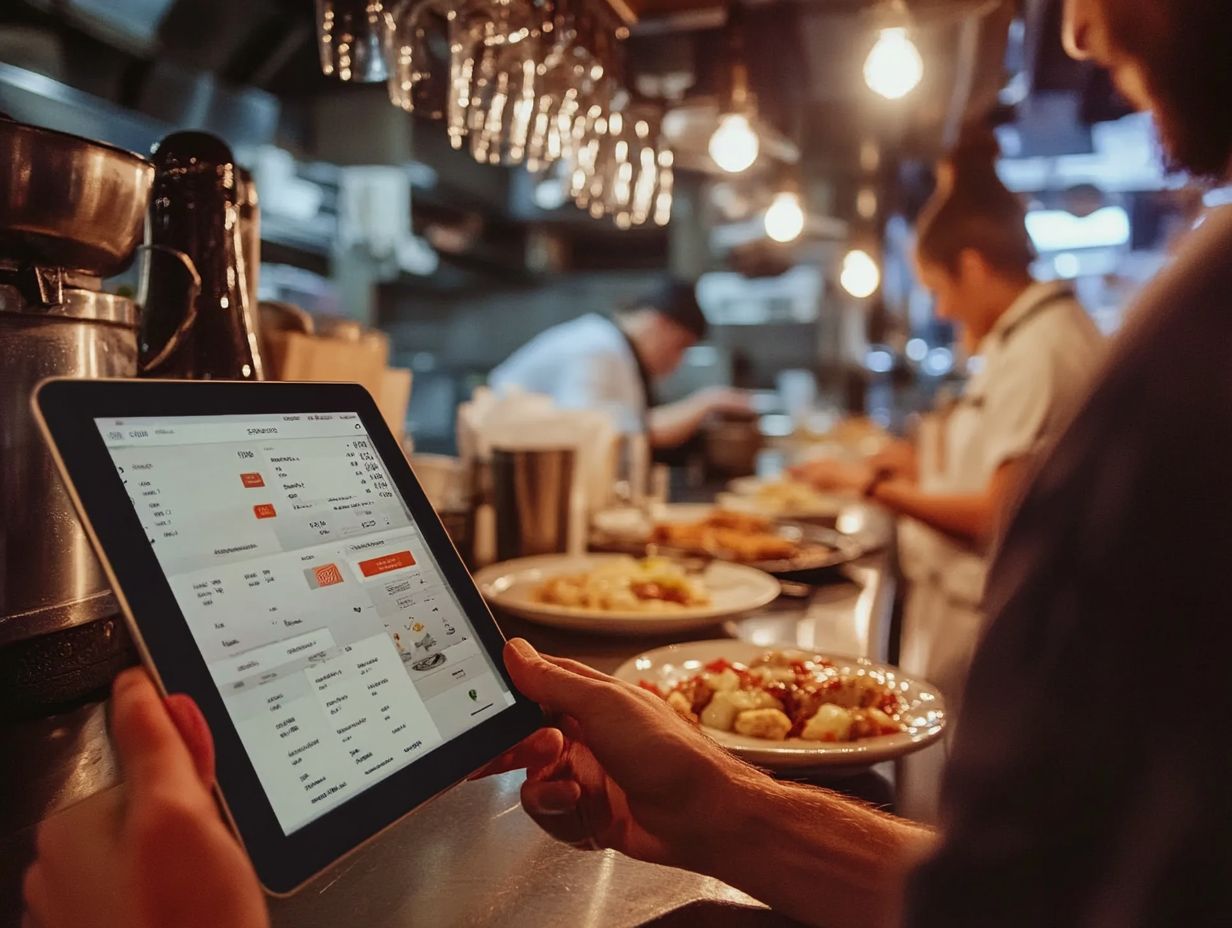
Enhance customer service and loyalty by implementing a CRM system in your restaurant. Choose the right CRM software, train your staff, and analyze customer data to create personalized experiences for your target audience.
Monitor and adjust your CRM strategy to effectively market to your customers and improve overall business performance.
Understanding CRM in the Restaurant Industry
Understanding CRM in the restaurant industry is essential for building customer relationships, improving communication, and increasing customer satisfaction.
A robust Customer Relationship Management (CRM) system can streamline your business processes and provide valuable insights into customer behavior, preferences, and feedback. These insights are crucial for optimizing efficiency and enhancing customer engagement.
With effective contact management, you can tailor your services to meet customer expectations, ultimately boosting loyalty and retention.
What is CRM and Why is it Important?
CRM, or Customer Relationship Management, involves the strategies and technologies you use to manage customer interactions and data throughout the entire customer lifecycle. CRM helps businesses manage relationships with customers and improve their experiences.
By utilizing CRM systems, you can streamline your processes, create a centralized database, and foster personalized communication with your clients. This sophisticated software boosts the effectiveness of your marketing efforts and enhances customer service by offering real-time insights into customer behavior and preferences.
With this valuable information at your fingertips, you can anticipate customer needs, leading to increased satisfaction. A well-implemented CRM builds loyalty and trust among your customers through consistent, personalized engagement, ultimately forging stronger, long-term relationships.
Benefits of Implementing CRM in Your Restaurant
Implementing a CRM system in your restaurant brings a wealth of benefits that can significantly elevate both your operational efficiency and customer experience.
Improved Customer Service
One of the standout benefits of a CRM system lies in its ability to enhance customer service, allowing restaurants to deliver personalized experiences tailored to each interaction.
This technology allows establishments to carefully keep track of conversations with clients, ensuring that every staff member is well-informed about a customer s history and preferences. This leads to more meaningful and engaging interactions.
By providing insights into past orders or special occasions, you can craft memorable dining experiences that resonate with your patrons. CRM tools also streamline the management of service requests, enabling quick resolutions and enhancing overall satisfaction.
Ultimately, leveraging a robust CRM system supports the delivery of personalized offerings and fosters lasting relationships with customers an essential strategy in today s fiercely competitive landscape.
Don t miss out on transforming your restaurant experience get started with a CRM today and watch your customer satisfaction soar!
Increased Customer Loyalty

Increased customer loyalty is a key benefit of effective CRM. It enables restaurants to create and manage loyalty programs that resonate with their customers’ preferences.
By tracking customer preferences and behaviors, CRM systems provide invaluable insights into what matters to your clientele. This understanding is crucial for designing personalized loyalty programs that attract new customers and enhance experiences for existing ones.
When a restaurant identifies specific dining habits, favorite dishes, or peak visiting times, it can craft promotions and rewards that connect with its audience. Monitoring customer interactions allows you to pinpoint areas for improvement, helping you refine retention strategies and create a smooth customer journey that fosters long-term loyalty.
Effective Marketing Strategies
Effective marketing strategies are grounded in a solid understanding of customer insights, which you can cultivate through a well-implemented CRM system. This powerful tool allows you to collect and analyze data about your customers preferences and feedback.
By leveraging this information, you can create targeted marketing campaigns that truly resonate with specific segments of your clientele.
For example, you might discover a group of loyal patrons who regularly order vegetarian options. You could design promotions specifically for plant-based dishes based on this insight. With in-depth analytics at your disposal, you can identify seasonal trends, allowing you to adjust your marketing strategies and ensure your offerings remain appealing to your audience.
Steps to Implement CRM in Your Restaurant
Implementing a CRM system in your restaurant is a strategic endeavor that requires thoughtful planning and execution. By following key steps, you can ensure a smooth integration for the best results.
1. Identify Your Target Audience
Identifying your target audience is the first step in implementing a CRM system. It enables you to tailor your services and marketing strategies to meet the specific needs of your customers.
By analyzing customer behavior, you can uncover insights into purchasing habits, preferences, and pain points. This may involve tracking customer interactions across various channels, such as social media and website analytics, to recognize patterns that reveal your ideal customers.
Creating detailed customer profiles enhances your understanding by compiling demographic data, lifestyle choices, and buying motivations. These profiles allow you to personalize your outreach and foster deeper connections, boosting customer loyalty and satisfaction.
Understanding the unique characteristics of your audience is essential for aligning your product offerings with genuine market demands.
2. Choose the Right CRM Software
Choosing the right CRM software is vital for maximizing your restaurant’s operational efficiency and ensuring the system aligns with your unique needs and goals.
A user-friendly interface is critical, allowing your staff to navigate the platform effortlessly without extensive training. This saves time and boosts overall productivity.
Robust data analytics capabilities are essential, enabling you to gain valuable insights into customer behavior and preferences. These insights inform your marketing strategies and menu adjustments, helping you serve your guests better.
The software should connect easily with your existing systems, like point of sale (POS) systems and reservation platforms, streamlining your operations and enhancing the overall dining experience.
By prioritizing these features when evaluating different CRM software options, you’ll see a positive impact on your restaurant management.
Start implementing a CRM system today for better customer engagement and loyalty!
3. Train Your Staff
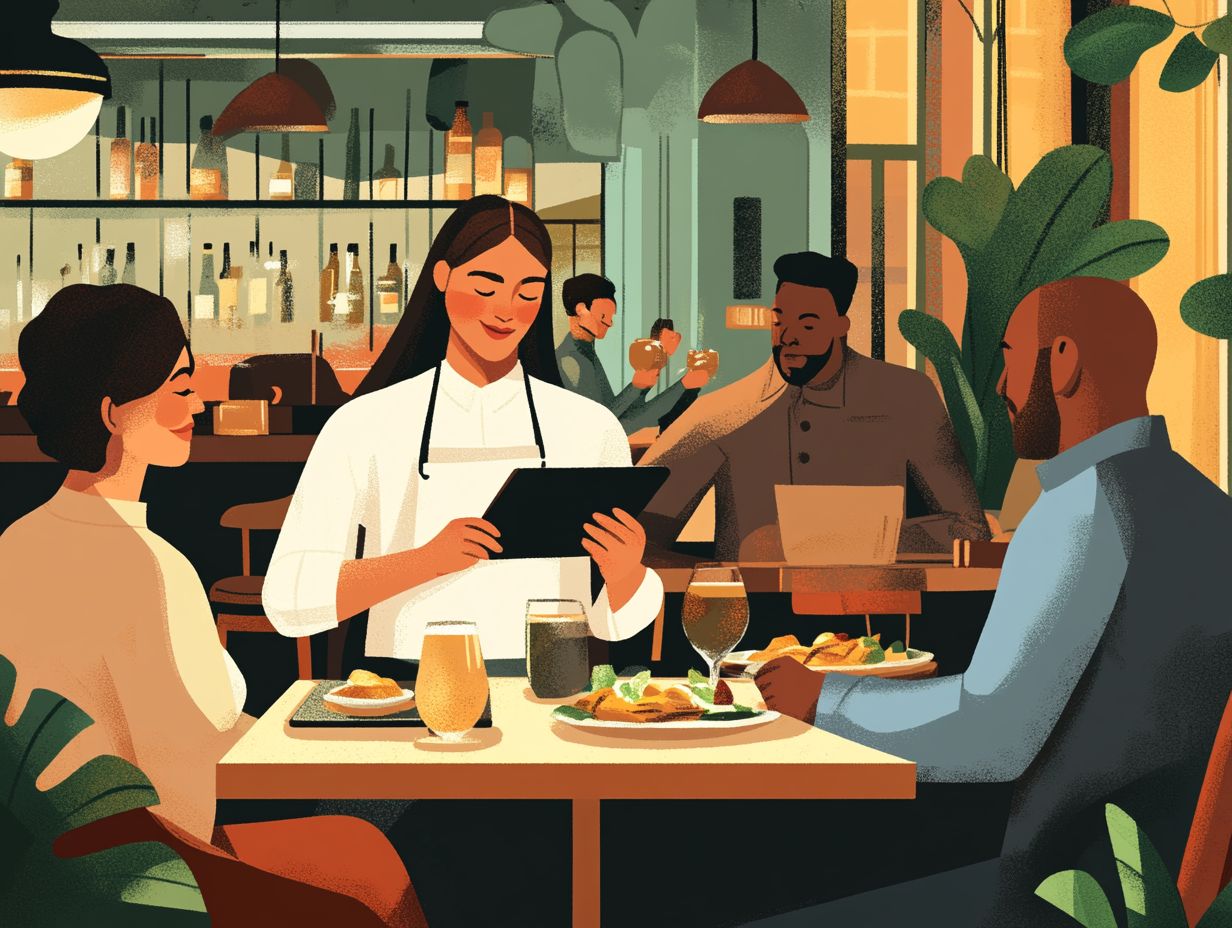
Training your staff on effectively using the CRM system is essential. It enables them to harness its features, enhancing team communication and operational efficiency.
When employees are familiar with the CRM’s functionalities, they can track customer interactions, manage leads, and analyze data effectively. This contributes to smarter decision-making.
Comprehensive training ensures that your team knows how to navigate the tool and understands its importance in personalizing customer experiences.
Key strategies for successful training include hands-on workshops, regular refreshers, and user-friendly manuals.
Investing in thorough CRM training also fosters a culture of continuous learning and adaptability. This leads to improved customer service and streamlined operations as employees gain confidence and capability in their roles.
4. Collect and Analyze Customer Data
Collecting and analyzing customer data lies at the heart of CRM implementation. It offers invaluable insights into customer preferences, behaviors, and feedback.
Employ various methods like surveys, online feedback forms, and social media monitoring to gather comprehensive data that reflects your customers’ voices. This information is essential for tailoring your offerings and communications to meet your audience’s evolving needs.
Implementing effective data management practices is crucial for organizing and easily accessing collected data. By using easy-to-understand data analysis tools within your CRM system, you can uncover trends and patterns that enhance your ability to build stronger relationships and make informed decisions.
5. Create Personalized Experiences
Creating personalized experiences for customers is one of the standout advantages of CRM systems. They allow you to tailor your offerings based on individual customer interactions.
By utilizing customer data, you gain insights into preferences and dining habits, ensuring that each guest feels recognized and valued. This personalization paves the way for targeted promotions, customized menus, and exclusive event invitations that resonate with your clientele.
When customers enjoy tailored experiences that align with their needs, their satisfaction skyrockets. This fosters stronger loyalty and encourages word-of-mouth referrals, ultimately cultivating a more engaged and devoted customer base.
6. Monitor and Adjust Your CRM Strategy
Monitoring and adjusting your CRM strategy is crucial for ensuring its ongoing effectiveness and alignment with your restaurant’s goals.
By using data analytics and actively seeking customer feedback, you can uncover emerging trends and preferences that might otherwise go unnoticed. This proactive approach sharpens your marketing initiatives and boosts operational efficiency.
When adjustments are made based on real-time insights, your restaurant can supercharge its processes, cut waste, and elevate overall service delivery.
Cultivating a culture of continuous improvement through these assessments directly enhances customer satisfaction and loyalty, making it an essential element of a successful CRM framework.
Frequently Asked Questions
Q1. What is CRM and why is it important for restaurants?
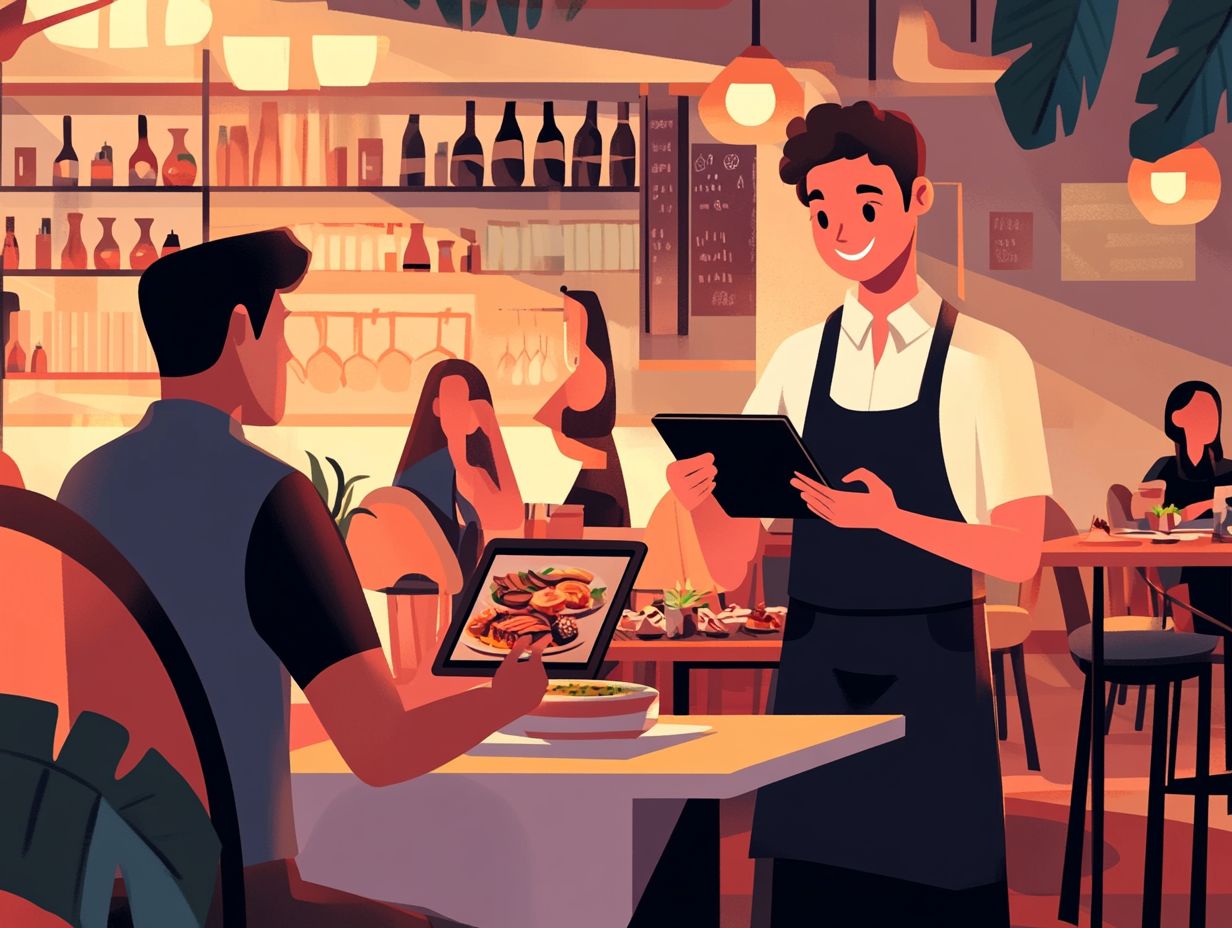
CRM stands for Customer Relationship Management. It is a strategy for managing and analyzing interactions with customers. CRM is important for restaurants as it helps build stronger relationships, improves customer retention, and increases revenue through personalized experiences.
Q2. How can I implement CRM in my restaurant?
Implementing CRM in your restaurant involves using software or tools to collect and analyze customer data, such as ordering habits and contact information. This data can then be used to personalize and enhance the customer experience.
Q3. What are the benefits of using CRM in my restaurant?
Using CRM can greatly improve customer satisfaction. It also boosts loyalty and retention by helping you identify and target your most valuable customers.
Q4. What type of CRM software should I use for my restaurant?
Choose CRM software designed for the restaurant industry. Look for features like table management, loyalty programs, and customer data analysis to meet your needs.
Q5. How can I train my staff to use CRM effectively?
Involve your staff in the CRM setup. Provide proper training to ensure they understand how to use the system in their daily tasks.
Q6. Can I use CRM for my online orders and delivery services?
Absolutely! CRM can enhance your online orders and delivery services. Use the data to create personalized experiences and target promotions to specific customers, boosting satisfaction and loyalty.

